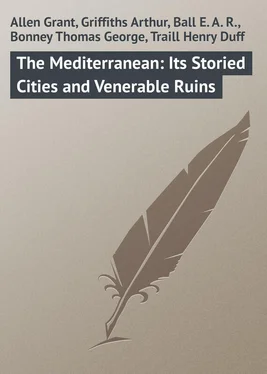E. Ball - The Mediterranean - Its Storied Cities and Venerable Ruins
Здесь есть возможность читать онлайн «E. Ball - The Mediterranean - Its Storied Cities and Venerable Ruins» — ознакомительный отрывок электронной книги совершенно бесплатно, а после прочтения отрывка купить полную версию. В некоторых случаях можно слушать аудио, скачать через торрент в формате fb2 и присутствует краткое содержание. Жанр: Путешествия и география, foreign_prose, foreign_language, на английском языке. Описание произведения, (предисловие) а так же отзывы посетителей доступны на портале библиотеки ЛибКат.
- Название:The Mediterranean: Its Storied Cities and Venerable Ruins
- Автор:
- Жанр:
- Год:неизвестен
- ISBN:нет данных
- Рейтинг книги:3 / 5. Голосов: 1
-
Избранное:Добавить в избранное
- Отзывы:
-
Ваша оценка:
- 60
- 1
- 2
- 3
- 4
- 5
The Mediterranean: Its Storied Cities and Venerable Ruins: краткое содержание, описание и аннотация
Предлагаем к чтению аннотацию, описание, краткое содержание или предисловие (зависит от того, что написал сам автор книги «The Mediterranean: Its Storied Cities and Venerable Ruins»). Если вы не нашли необходимую информацию о книге — напишите в комментариях, мы постараемся отыскать её.
The Mediterranean: Its Storied Cities and Venerable Ruins — читать онлайн ознакомительный отрывок
Ниже представлен текст книги, разбитый по страницам. Система сохранения места последней прочитанной страницы, позволяет с удобством читать онлайн бесплатно книгу «The Mediterranean: Its Storied Cities and Venerable Ruins», без необходимости каждый раз заново искать на чём Вы остановились. Поставьте закладку, и сможете в любой момент перейти на страницу, на которой закончили чтение.
Интервал:
Закладка:
Thirst after knowledge characterizes all classes of the community. A workman’s literary club, or Athenæum, founded a few years back, is now a flourishing institution, aided by municipal funds. No kind of recreation is allowed within its walls. Night-schools opened here are attended by several hundred scholars. Barcelona also boasts of an Academy of Belles Lettres , the first founded in Spain; schools of natural science, chemistry, agriculture, of medicine and surgery, of jurisprudence, an academy devoted to the culture of the Catalonian language, and containing library and museum. This society has greatly contributed to the protection of ancient buildings throughout the province, besides amassing valuable treasure, legend, botanical and geological specimens and antiquities. The Archæological Society of Barcelona has also effected good work: to its initiative the city is mainly indebted for the charming little collection of antiquities known as the “Museo Provincial,” before alluded to.
In places of public entertainment Barcelona is unusually rich. Its Opera House, holding four thousand spectators, equals in spaciousness the celebrated house of Moscow. The unpretentious exterior gives no idea of the splendor within. A dozen theaters may be counted besides. Bull-fights, alas! still disgrace the most advanced city of the Peninsula. The bull-ring was founded in 1834, and the brutal spectacle still attracts enormous crowds, chiefly consisting of natives. The bull-fight is almost unanimously repudiated by foreign residents of all ranks.
A few words must now be said about the history of this ancient place. The city founded here by Hamilcar Barco, father of the great Hannibal, is supposed to stand on the site of one more ancient still, existing long before the foundation of Rome. The Carthaginian city in 206 B. C. became a Roman colonia, under the title of “Faventia Julia Augusta Pia Barzino,” which was eclipsed in importance, however, by Tarragona, the Roman capital. In 409 A. D. it was taken by the Goths, and under their domination increased in size and influence, coining its own money stamped with the legend “Barcinona.” On the destruction of Tarragona by the Moors Barcelona capitulated, was treated with clemency, and again became a metropolis. After many vicissitudes it was ruled in the ninth century by a Christian chief of its own, whose descendants till the twelfth governed it under the title of Counts of Barcelona, later assuming that of Kings of Aragon, to which kingdom the province was annexed. During the Middle Ages Barcelona played a foremost part in the history of commerce. In the words of Ford, “Like Carthage of old, it was the lord and terror of the Mediterranean. It divided with Italy the enriching commerce of the East. It was then a city of commerce, conquest, and courtiers, of taste, learning, and luxury – the Athens of the troubadour.”
Its celebrated commercial code, framed in the thirteenth century, obtained acceptance throughout Europe. Here one of the first printing-presses in Spain was set up, and here Columbus was received by Ferdinand and Isabella after his discovery of a new world. A hundred years later a ship was launched from the port, made to move by means of steam. The story of Barcelona is henceforth but a catalogue of tyrannies and treacheries, against which the brave, albeit turbulent, city struggled single-handed. In 1711 it was bombarded and partly ruined by Philip V.; a few years later, after a magnanimous defense, it was stormed by Berwick, on behalf of Louis XIV., and given up to pillage, outrage, fire, and sword. Napoleon’s fraudulent seizure of Barcelona is one of the most shameful pages of his shameful history. The first city – the key of Spain, as he called it – only to be taken in fair war by eighty thousand men, was basely entrapped, and remained in the hands of the French till the Treaty of Paris in 1814. From that time Barcelona has only enjoyed fitful intervals of repose. In 1827 a popular rising took place in favor of Don Carlos. In 1834 Queen Christina was opposed, and in 1840 public opinion declared for Espartero. In 1856 and 1874 insurrections occurred, not without bloodshed.
Barcelona is a great gathering-place of merchants from all parts of Europe. In its handsome hotels is heard a very Babel of tongues. The principal manufactures consist of woolen stuffs – said to be inferior to English in quality – silk, lace, firearms, hats, hardware, pianos; the last, as has been already stated, of excellent quality, and low in price. Porcelain, crystal, furniture, and inlaid work, must be included in this list, also ironwork and stone blocks.
Beautifully situated on the Mediterranean between the mouths of two rivers, – the Llobregat and the Besos – and possessing one of the finest climates in the world, Barcelona is doubtless destined ere long to rival Algiers as a health resort. Three lines of railway now connect it directly with Paris, from which it is separated by twenty-eight hours’ journey. The traveller may leave Barcelona at five o’clock in the morning and reach Lyons at midnight with only a change of carriages on the frontier. The route viâ Bordeaux is equally expeditious; that by way of Clermont-Ferrand less so, but more picturesque. Hotels in the capital of Catalonia leave nothing to desire on the score of management, hygiene, comfort, and prices strictly regulated by tariff. The only drawback to be complained of is the total absence of the feminine element – not a woman to be seen on the premises. Good family hotels, provided with lady clerks and chambermaids, is a decided desideratum. The traveller wishing to attain a knowledge of the Spanish language, and see something of Spanish life and manners, may betake himself to one of the numerous boarding-houses.
Barcelona is very rich in philanthropic and charitable institutions. Foremost of these is its Hospital of Santa Cruz, numbering six hundred beds. It is under the conjoint management of sisters and brothers of charity and lay nurses of both sexes. An asylum for the insane forms part of the building, with annexes for the convalescent. The Hospital del Sagrado Corazon, founded by public subscription in 1870 for surgical cases, also speaks volumes for the munificence of the citizens. The only passport required of the patient is poverty. One interesting feature about this hospital is that the committee of management consists of ladies. The nursing staff is formed of French Sisters of St. Vincent de Paul. Besides these must be named the orphanage for upwards of two thousand children of both sexes – Casa de Caridad de la Provincia de Barcelona – asylums for abandoned infants, for the orphaned children of seamen, maternity hospitals, crêches, etc. There is also a school for the blind and deaf mutes, the first of the kind established in Spain. Here the blind of both sexes receive a thorough musical training, and deaf mutes are taught according to the system known as lip-speech. All teaching is gratuitous.
Конец ознакомительного фрагмента.
Текст предоставлен ООО «ЛитРес».
Прочитайте эту книгу целиком, купив полную легальную версию на ЛитРес.
Безопасно оплатить книгу можно банковской картой Visa, MasterCard, Maestro, со счета мобильного телефона, с платежного терминала, в салоне МТС или Связной, через PayPal, WebMoney, Яндекс.Деньги, QIWI Кошелек, бонусными картами или другим удобным Вам способом.
Интервал:
Закладка:
Похожие книги на «The Mediterranean: Its Storied Cities and Venerable Ruins»
Представляем Вашему вниманию похожие книги на «The Mediterranean: Its Storied Cities and Venerable Ruins» списком для выбора. Мы отобрали схожую по названию и смыслу литературу в надежде предоставить читателям больше вариантов отыскать новые, интересные, ещё непрочитанные произведения.
Обсуждение, отзывы о книге «The Mediterranean: Its Storied Cities and Venerable Ruins» и просто собственные мнения читателей. Оставьте ваши комментарии, напишите, что Вы думаете о произведении, его смысле или главных героях. Укажите что конкретно понравилось, а что нет, и почему Вы так считаете.












